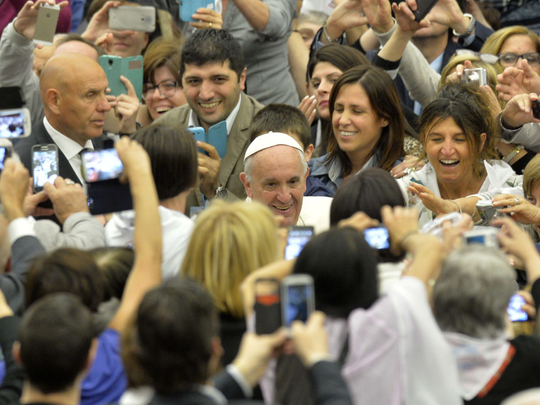
Two significant events have joyfully brought Palestine to the forefront, though briefly, of world news. The first was when the Vatican’s chief, the Argentine Pope Francis, last Sunday named two 19th century Palestinian nuns as saints. The second event took place a week earlier, on May 13, when the Vatican officially declared its full diplomatic and political recognition of Palestine as a fully independent state.
The two nuns are the first Arabs to gain sainthood in the Catholic Church’s history. Pope Francis celebrated the event in an open-air mass at Rome’s St Peter’s Square, attended by Palestinian President Mahmoud Abbas and more than 2,000 Arabs from Palestine, Jordan and Israel. In addition to the delightfully unprecedented event of canonisation of two Arab nuns, the life of the two 19th century holy nuns demonstrates a highly interesting piece of their country’s sad history. They both sadly never saw their country of origin as an independent state.
Marie Alphonsine Ghattas, who was born in 1843 in Jerusalem when it was under the Ottoman Empire, passed away during the colonial British Mandate period in 1927. The newly named saint was beatified, as a final step before canonisation, in 2009. The second Arab nun, Mariam Bawardy, was born in Galilee in 1846. She became a nun in France before returning to Bethlehem where she died in 1878. Bawardy was beatified by Pope John Paul II in 1983.
Becoming a saint, according to the Catholic Church, is a tough challenge. A nun must have lived a holy life as determined by the church itself and must have at least two miracles to her name. During her life, Ghattas is thought to have seen the Virgin Mary in several apparitions, while Bawardy, after becoming a nun of the Carmelite order, helped found the Carmelite Monastery in Bethlehem. Prior to that, Bawardy, orphaned at a young age and illiterate, sought refuge in the church after her throat was slit by an angry young man, madly in love with her, when she refused to convert to Islam. With the help of the church, she managed to travel to France and become a nun. She then moved on to India to help set up a monastery there before returning to settle down in Bethlehem.
Relations with the Vatican
But the more politically significant event is really the official recognition of Palestine by the Vatican earlier this month, as this step takes bilateral relations to a higher level at a time when Israel is increasing its nasty grip over Palestinian territories. Representing more than 1.2 billion Catholics worldwide, Pope Francis had already publicly expressed sympathy for the Palestinian cause during his visit to Ramallah in May 2014. However, the latest recognition of Palestine by the Vatican came as no great surprise at all. It is in fact, a logical consequence of a long-term relation between the Vatican and the leadership of Palestine Liberation Organisation (PLO) since the creation of the state of Israel in 1948.
The bilateral relation has intensified as from mid-1990s when Palestinian diplomacy was actively involved in lobbying the Holy See. Many PLO envoys made it to Rome over the years to pave the way for such eventual recognition. One who stands out among them is the former Head of Mission in UK, Washington DC, Moscow and currently ambassador at large based in London — Afif Safia. During his long posting in London, Safia, himself a Catholic, succeeded in keeping the lines open between PLO and the Vatican. He is believed to have been instrumental in arranging the first ever meeting between the late PLO leader, Yasser Arafat, and Pope John Paul II in 1987. Persistent Palestinian networking led to establishing diplomatic relations with the Holy See back in 1994.
Pope John Paul II, who met the late PLO leader 12 times, made an emotional appeal backing Palestinian national aspirations during his trip to Bethlehem in 2000. The Vatican and Palestinian government signed an agreement in a historic meeting between the Pope and Arafat in the Vatican in the same year on mutual relations that highlighted the “inalienable national legitimate rights and aspirations of the Palestinian People”.
This agreement attracted severe attack by Israel and was also criticised by the US. The orthodox Jewish movement, ‘the Temple Mount Faithful’ described the bilateral agreement a “direct, blatant move against the God and people of Israel and Jerusalem. It was a covenant between two enemies of Israel who for a long time would rather have Israel disappear from the Promised Land as soon as possible”.
Now with the latest Vatican announcement, the Holy See joins some 135 nations that have already recognised the state of Palestine. Obviously Israel and the US are not among them. They both indicated that birth of a Palestinian state is conditional on peace talks between the Palestinian National Authority and Israel, not through declarations of recognition.
Israeli officials have expressed “disappointment” over the latest move by the Vatican, but interestingly, the US State Department has declined to comment on it. In fact, the Obama administration has recently indicated that a review of the best way to go forward in support of the two-state solution was overdue. This came after Benjamin Netanyahu committed himself not to allow a Palestinian state so long as he remained the Prime Minister of Israel.
One wonders whether this a prelude to a bold statement to be made by Obama, recognising the Palestinian state before he departs the White House?
Mustapha Karkouti is a former president of the Foreign Press Association, London.









